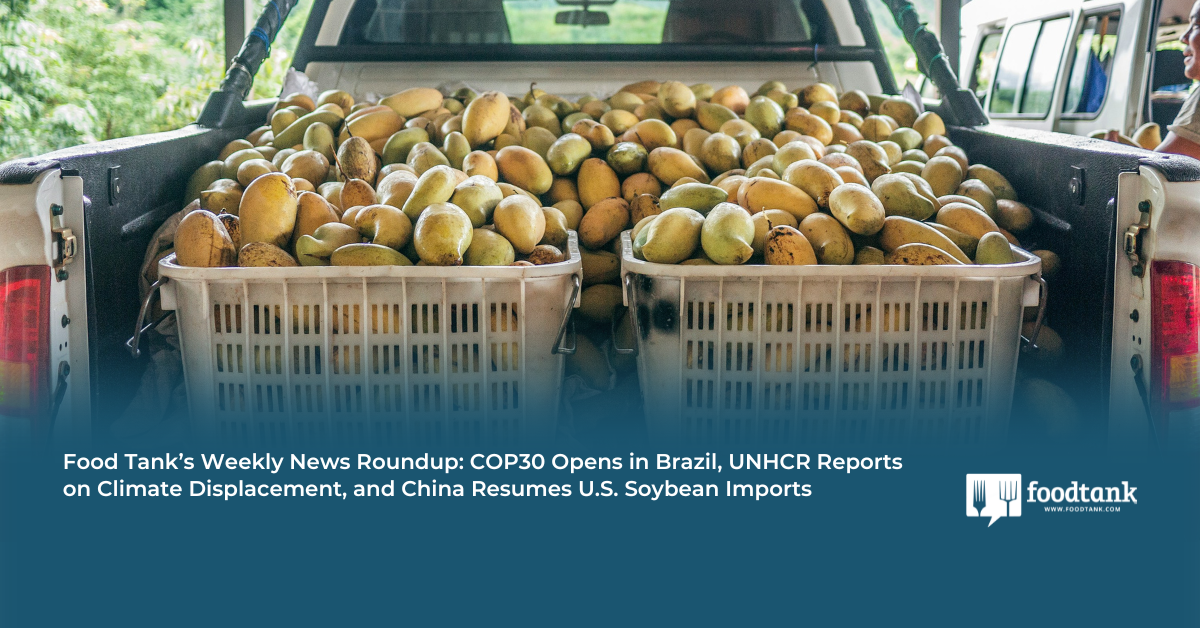Each week, Food Tank is rounding up a few news stories that inspire excitement, infuriation, or curiosity.
The Federal Government Shutdown Ends
Earlier this week, eight members of the Senate Democratic Caucus sided with Republican colleagues by voting to reopen the government and end the longest shutdown in U.S. history. On Wednesday, the House passed the spending package, sending it to President Donald Trump, who quickly signed it into law.
Prior to the end of the shutdown, several states including New York, Delaware, Rhode Island, Virginia and Maryland allocated funding to their Supplemental Nutrition Assistance Programs. Most states announced that residents enrolled in the program will receive their November benefits by the end of the week, but households in states such as Louisiana and Kentucky may have to wait a bit longer until all benefits are issued in full.
The end of the shutdown also came with an extension of the 2018 Farm Bill for another year.
COP30 Opens in Brazil as Food, Climate, and Finance Take Center Stage
The 2025 U.N. Climate Change Conference (COP30) opened this week in Belém, Brazil, where food systems, forest protection, climate finance, and agricultural adaptation are emerging as central themes. “Your job here is to fight this climate crisis, together,” U.N. Climate Chief Simon Stiell urged delegates during the opening session.
Ahead of the summit, 43 countries and the European Union adopted the Belém Declaration on Hunger, Poverty, and Human-Centered Climate Action, calling for a shift in how the international community addresses the climate crisis and recognizing that the world’s poorest communities often bear the brunt of its impacts. The declaration highlights a shift toward adaptation-focused finance. As Raj Patel of IPES-Food notes, “Brazil’s recent history proves that when governments back family farmers and prioritise social policies, hunger falls.”
The Brazilian COP30 Presidency also launched the Tropical Forests Forever Facility (TFFF), designed to provide long-term, predictable funding for tropical forest protection. Brazil, Indonesia, Norway, and Portugal made initial pledges toward the initiative’s US$125 billion target. Food and agriculture action continued with the U.N. Environment Programme’s Food Waste Breakthrough, a four-year, US$3 million initiative to help cities halve food waste and cut methane emissions. The effort aims to tackle “the unforgiveable amount of food” wasted globally each year, says Executive Director Inger Andersen.
Separately, Italy announced it is joining the Alliance of Champions for Food Systems Transformations, committing to integrate climate action, nutrition, livelihoods, biodiversity, and mitigation across food systems policy. And Ethiopia is set to host COP32 in 2027, signaling increasing engagement from African nations in global climate and food negotiations.
Subscribe here to receive Food Tank’s special daily newsletter series throughout COP30, sharing on-the-ground updates and key developments from Belém. And see Food Tank’s first daily dispatches HERE and HERE, with reporting from week one of the Conference.
UNHCR Warns 250 Million Displaced by Climate Disasters, Urges Urgent Climate Finance Reform
A new report from the U.N. Refugee Agency (UNHCR), No Escape II: The Way Forward, reveals that climate-related disasters have forcibly displaced 250 million people over the past decade—equivalent to 70,000 people every day. Floods, storms, droughts, and extreme heat are driving increasingly severe humanitarian crises, with 150 record-breaking weather events recorded in 2024 alone.
The report finds that climate impacts are compounding conflict, deepening poverty, and threatening food and water security through desertification, rising sea levels, and ecosystem collapse. By mid-2025, 86 million displaced people were living in areas facing high to extreme exposure to climate hazards, with many of the world’s largest refugee settlements located in zones of intense heat and flooding.
UNHCR warns that climate finance is failing to reach those most in need. Extremely fragile states receive just US$2 per person per year in adaptation funding, compared with more than US$160 per person in stable countries. “If we want stability, we must invest where people are most at risk,” said Filippo Grandi, U.N. High Commissioner for Refugees. “To prevent further displacement, climate financing needs to reach the communities already living on the edge.”
UNHCR urges governments and donors to bridge the growing gap between rhetoric and reality—“not with words, but with firm will, solidarity, and sustained climate action.”
China Ends Ban on U.S. Soybean Imports Following Trump-Xi Summit
China has lifted its months-long suspension on U.S. soybean imports, reopening its market to American farmers for the first time since the spring. The decision, which restores import licenses for three major U.S. exporters, follows last week’s trade summit between President Donald Trump and Chinese President Xi Jinping.
As part of the agreement, Beijing pledged to buy at least 12 million tons of U.S. soybeans before year-end, with purchases expected to rise to 25 million tons annually over the next three years. The move marks a key step in restoring agricultural trade between the world’s two largest economies, which has been strained by years of tariffs and retaliatory restrictions.
Chinese buyers have already booked 120,000 tons of U.S. wheat and a shipment of sorghum—their first in a year—after Beijing confirmed it had suspended additional retaliatory tariffs on U.S. imports, including farm goods. However, a 13 percent tariff still applies to soybean imports, making U.S. shipments less competitive than cheaper Brazilian cargoes.
While the White House hailed the deal as a win for American agriculture, many U.S. farmers remain cautious. Two producers in West Tennessee told CBS that they expect to lose a combined US$800,000 this year despite the policy shift, reflecting years of high costs, low prices, and lingering debt. “It will help pay some bills, but that’s not fixing the problem,” says farmer Franklin Carmack, noting that farmers “can’t wait this out”.
Others remain hopeful. Missouri farmer Brent Foreman says he trusts the administration’s approach: “I think he’s tryin’ to make us the best deal he can—for the whole country, but for the American farmer, for the long term”.
East Africa Takes Steps to Boost Agroecology Through Regional Trade Commitments
The East African Community (EAC) is stepping up efforts to strengthen agroecological cross-border trade across its eight member states. A regional conference in Jinja, Uganda, concluded with the Jinja Declaration on Advancing Cross-Border Trade for Agroecological Produce, a landmark commitment to promote trade grounded in justice, sustainability, and ecological integrity.
The declaration urges governments to remove non-tariff barriers, improve market infrastructure, and harmonize agricultural and trade policies to benefit smallholder farmers, women, youth, and Indigenous communities. “Every stakeholder has a responsibility to ensure accelerated regional economic growth through agroecology,” says Dr. Million Belay, General Coordinator of the Alliance for Food Sovereignty in Africa (AFSA).
The resolutions call for investment in cold storage, transport networks, and border facilities to strengthen supply chains and reduce post-harvest losses. They also emphasized expanding Participatory Guarantee Systems and traceability mechanisms to build consumer trust in sustainably produced goods. The commitments stress gender equity, financial inclusion, and capacity building for producers and traders while recognizing the vital role of traditional knowledge and biodiversity in regional food systems.
AFSA noted that the initiative goes beyond economic reform, describing it as a moral and ecological imperative for Africa’s sustainable future.
Articles like the one you just read are made possible through the generosity of Food Tank members. Can we please count on you to be part of our growing movement? Become a member today by clicking here.
Photo courtesy of Phoenix Han, Unsplash


